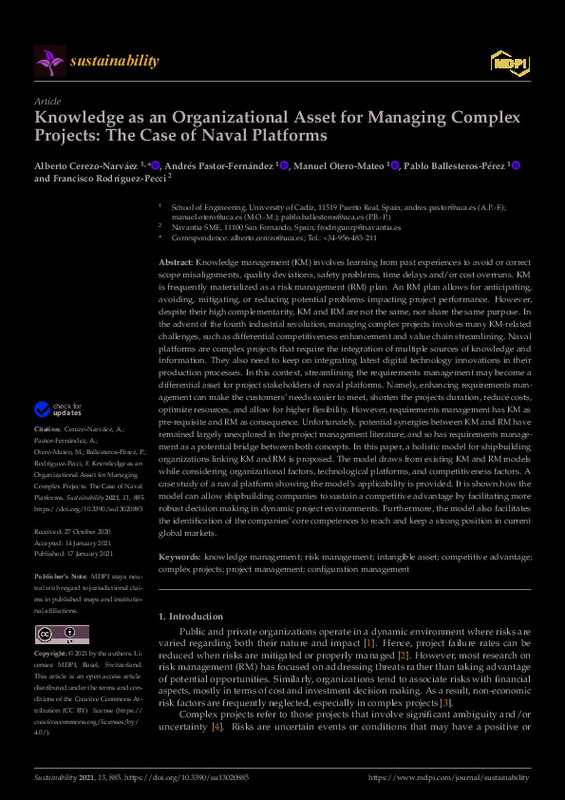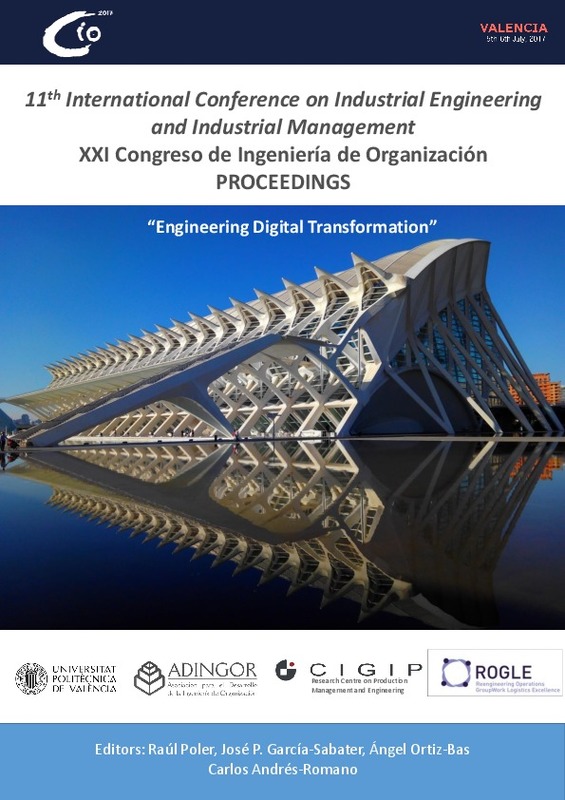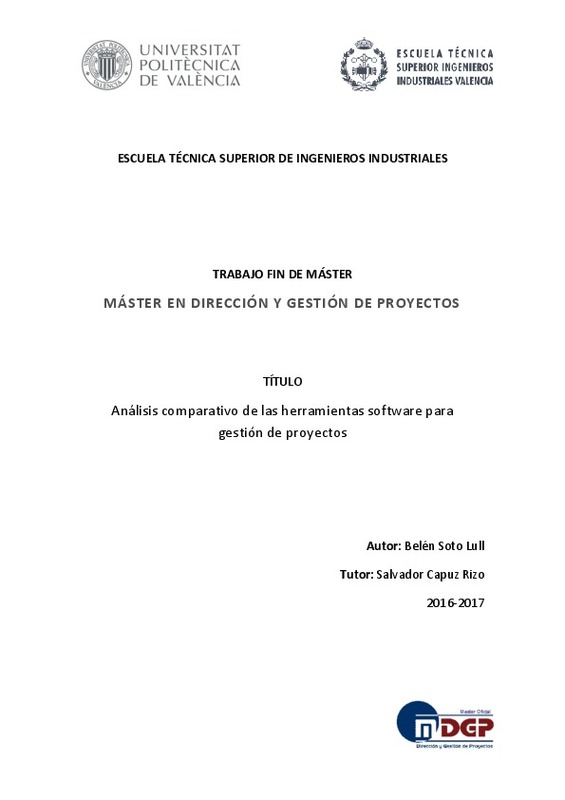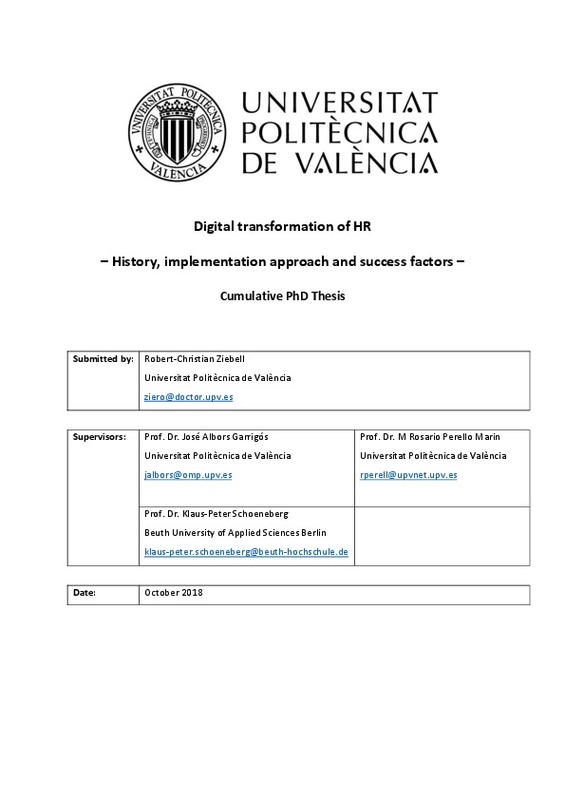JavaScript is disabled for your browser. Some features of this site may not work without it.
Buscar en RiuNet
Listar
Mi cuenta
Estadísticas
Ayuda RiuNet
Admin. UPV
Knowledge as an organizational asset for managing complex projects: The case of naval platforms
Mostrar el registro sencillo del ítem
Ficheros en el ítem
| dc.contributor.author | Cerezo-Narváez, Alberto
|
es_ES |
| dc.contributor.author | Pastor-Fernández, Andrés
|
es_ES |
| dc.contributor.author | Otero-Mateo, Manuel
|
es_ES |
| dc.contributor.author | Ballesteros-Pérez, Pablo
|
es_ES |
| dc.contributor.author | Rodríguez-Pecci, Francisco
|
es_ES |
| dc.date.accessioned | 2023-05-11T18:02:00Z | |
| dc.date.available | 2023-05-11T18:02:00Z | |
| dc.date.issued | 2021-01 | es_ES |
| dc.identifier.uri | http://hdl.handle.net/10251/193272 | |
| dc.description.abstract | [EN] Knowledge management (KM) involves learning from past experiences to avoid or correct scope misalignments, quality deviations, safety problems, time delays and/or cost overruns. KM is frequently materialized as a risk management (RM) plan. An RM plan allows for anticipating, avoiding, mitigating, or reducing potential problems impacting project performance. However, despite their high complementarity, KM and RM are not the same, nor share the same purpose. In the advent of the fourth industrial revolution, managing complex projects involves many KM-related challenges, such as differential competitiveness enhancement and value chain streamlining. Naval platforms are complex projects that require the integration of multiple sources of knowledge and information. They also need to keep on integrating latest digital technology innovations in their production processes. In this context, streamlining the requirements management may become a differential asset for project stakeholders of naval platforms. Namely, enhancing requirements management can make the customers¿ needs easier to meet, shorten the projects duration, reduce costs, optimize resources, and allow for higher flexibility. However, requirements management has KM as pre-requisite and RM as consequence. Unfortunately, potential synergies between KM and RM have remained largely unexplored in the project management literature, and so has requirements management as a potential bridge between both concepts. In this paper, a holistic model for shipbuilding organizations linking KM and RM is proposed. The model draws from existing KM and RM models while considering organizational factors, technological platforms, and competitiveness factors. A case study of a naval platform showing the model¿s applicability is provided. It is shown how the model can allow shipbuilding companies to sustain a competitive advantage by facilitating more robust decision making in dynamic project environments. Furthermore, the model also facilitates the identification of the companies¿ core competences to reach and keep a strong position in current global markets. | es_ES |
| dc.description.sponsorship | All authors acknowledge the help received by the research group TEP-955 from the PAIDI (Junta de Andalucia, Spain). The first author also acknowledges the research stay at the Engineering Projects Department at Universitat Politecnica de Valencia (Spain). The fourth author also acknowledges the Spanish Ministry of Science and Innovation for his Ramon y Cajal contract (RYC-2017-22222) co-funded by the European Social Fund. | es_ES |
| dc.language | Inglés | es_ES |
| dc.publisher | MDPI AG | es_ES |
| dc.relation.ispartof | Sustainability | es_ES |
| dc.rights | Reconocimiento (by) | es_ES |
| dc.subject | Knowledge management | es_ES |
| dc.subject | Risk management | es_ES |
| dc.subject | Intangible asset | es_ES |
| dc.subject | Competitive advantage | es_ES |
| dc.subject | Complex projects | es_ES |
| dc.subject | Project management | es_ES |
| dc.subject | Configuration management | es_ES |
| dc.subject.classification | PROYECTOS DE INGENIERIA | es_ES |
| dc.title | Knowledge as an organizational asset for managing complex projects: The case of naval platforms | es_ES |
| dc.type | Artículo | es_ES |
| dc.identifier.doi | 10.3390/su13020885 | es_ES |
| dc.relation.projectID | info:eu-repo/grantAgreement/MCIU//RYC-2017-22222//AYUDAS RAMON Y CAJAL/ | es_ES |
| dc.rights.accessRights | Abierto | es_ES |
| dc.contributor.affiliation | Universitat Politècnica de València. Escuela Técnica Superior de Ingenieros Industriales - Escola Tècnica Superior d'Enginyers Industrials | es_ES |
| dc.description.bibliographicCitation | Cerezo-Narváez, A.; Pastor-Fernández, A.; Otero-Mateo, M.; Ballesteros-Pérez, P.; Rodríguez-Pecci, F. (2021). Knowledge as an organizational asset for managing complex projects: The case of naval platforms. Sustainability. 13(2):1-20. https://doi.org/10.3390/su13020885 | es_ES |
| dc.description.accrualMethod | S | es_ES |
| dc.relation.publisherversion | https://doi.org/10.3390/su13020885 | es_ES |
| dc.description.upvformatpinicio | 1 | es_ES |
| dc.description.upvformatpfin | 20 | es_ES |
| dc.type.version | info:eu-repo/semantics/publishedVersion | es_ES |
| dc.description.volume | 13 | es_ES |
| dc.description.issue | 2 | es_ES |
| dc.identifier.eissn | 2071-1050 | es_ES |
| dc.relation.pasarela | S\443105 | es_ES |
| dc.contributor.funder | European Social Fund | es_ES |
| dc.contributor.funder | Ministerio de Ciencia, Innovación y Universidades | es_ES |
| dc.subject.ods | 09.- Desarrollar infraestructuras resilientes, promover la industrialización inclusiva y sostenible, y fomentar la innovación | es_ES |











